– By P. Sai Sathya Prakash

Introduction
Today’s world is reshaping with the evolution of multilateralism and multilateral dialogue, anticipating a normative world order that incorporates and benefits nations. Chinese expansionism in recent times has led to the emergence of the arc of convergence of strategic interests between the other states. After gaining geostrategic influence in the South China Sea, China adopts a similar expansionist approach in the Indian Ocean Region, Sino-Indian border disputes, Taiwan Strait and Indo-Pacific region. The Indo-Pacific region extends from the West Pacific to the East coast of Africa, and is central to the world economy and world peace Today, It has become the lexicon of the foreign policy of India. Many multilateral dialogues like QUAD and AUKUS are emerging to balance the region and promote stable rule-based world order.
There are multiple Indo-Pacific alliances till present, including QUAD, Five Eyes, ANZUS and most recently, AUKUS. QUAD is exclusively a non-military alliance and focuses more on trade, climate change and global commons. Five Eyes partnership is an anglosphere intelligence alliance comprising the US, UK, Australia, Canada and New Zealand for cooperation in intelligence sharing. ANZUS is a security treaty among Australia, New Zealand and the US, Which has become too narrow, non-binding and lacks relevance today. On the other hand, AUKUS focuses on military capabilities, since the Indo-Pacific region requires a proactive military alliance.. On September 15, 2021, An enhanced trilateral security partnership was announced by the leaders of the United Kingdom, the United States and Australia, referred to as AUKUS. The inception of AUKUS raised a conflict of interest among various scholars resulting in debating the numerous impacts of AUKUS on the Indo-Pacific Region. One question often raised is, ‘Is QUAD significance diminished due to AUKUS?’.
The QUAD and The AUKUS
The QUAD or Quadrilateral Security Dialogue between the US, Australia, India and Japan is an informal strategic forum to ensure rule-based world order, promoting freedom of navigation and encouraging a liberal trading system. The inception of QUAD started during the 2004 Indian Ocean tsunami. In 2007 Shinzo Abe, then Prime Minister of Japan, formalised the alliance based around maritime security. It was disbanded soon due to a lack of cohesion among members. Due to the Chinese aggression and rapid expansionism, QUAD was revived to balance the region by expanding its existing agreements and promoting shared values. QUAD is often misinterpreted as an Asian NATO. However, it does not include collective defence. Instead, it focuses on addressing issues like climate change, cyberspace, COVID 19 crisis management, vaccine diplomacy, trade and investments, technological cooperation and maritime security The QUAD aims to prevent Chinese monopoly and provide an alternative evident system.
Whereas AUKUS is a trilateral security partnership between the United Kingdom, the United States and Australia, the announcement of AUKUSt came just before the QUAD summit on September 24, 2021. AUKUS is a narrow defence pact and focuses only on security and defence cooperation in the Indo-Pacific region. AUKUS aims to bring the UK close to the Indo-Pacific region and share nuclear Submarine Technology with Australia to acquire nuclear-powered submarines. Australia now can enter the South-China Sea and allow it to counter Chinese aggression. Since other Indo-Pacific alliances are non-military, for instance, India’s policy of not engaging in any military security pacts directly in the Indo-Pacific and Japan’s sensitivity about nuclear technology allows the UK, US and Australia to form AUKUS makes sense.
The Synergy Between QUAD and AUKUS
However, AUKUS and QUAD share a vision to balance the Indo-Pacific region. QUAD is a broader multilateral dialogue and works on the members’ shared interests. At the same time, AUKUS is a narrow security treaty and pure military deterrence. Its main aim is to protect the Indo-Pacific region from Chinese influence. Recently many scholars have argued that ‘AUKUS has nothing to do with QUAD’, ‘No links between AUKUS or QUAD’ or ‘AUKUS do not affect the functioning of QUAD’, Nevertheless, in the context of the QUAD, AUKUS has relevance and significance in the long term as both of the alliances share a similar vision that is the free and open Indo Pacific. All the Indo-pacific alliances complement each other resulting in a more prominent political and strategic consensus. Until now, all the partnerships were either political, diplomatic or mini lateral and lacked the defence and security dimension formally. The more considerable security and strategic burden shift to AUKUS will help QUAD retain its ASEAN centrality and power dynamics. Therefore, AUKUS addresses the defence partnership by assertively upgrading military power to work as an efficient deterrence against China when needed. Thus, It may not diminish the role of QUAD as both have specific plans, different objectives and diverse strategies but certainly have significance on QUAD.
Indian Perspective
Currently, India is aware of Chinese ambitions to achieve an Unipolar Asia. India’s new offensive-defensive doctrine is no more defensive about partnering with the West to balance the region. India believes that preventing Chinese influence is not only the reason for the emergence of these multilateral dialogues. The purpose of these multilateral dialogues is also to work on climate change, cooperation on emerging technologies, blue economy, academic collaborations and vaccine diplomacy to bring regional stability. Hence the announcement of AUKUS brought divided opinions in India. Shri Harsh Vardhan Shringla, India’s foreign secretary, gave a formal response that AUKUS is not relevant to the QUAD and will not have any impact on its functioning. Many welcomed AUKUS because now the security domain expectations from QUAD will reduce. India can improve its non-military domain in the Indo-Pacific region after the post COVID world.
Moreover, a firm and capable Australia will go well with India’s interests to continue joint naval exercises, thus bolstering India-Australia strategic and defence cooperation. Nevertheless, many scholars feelfe India is left out as only one QUAD member has access to the US nuclear submarine technology. This announcement also built empathy for India’s closer defence partner France. Other scholars were sceptical about this partnership. Some argued that China might get provocative. There is a possibility that it will destabilise Western Pacific, which can be consequential to the Indian Ocean region. Others felt that strengthening Australian defence would mitigate India’s border conflict with China. Having foreign submarines presence in Indian waters and near the sea will only hamper India’s influence in the region, although Australia is a closer defence partner and QUAD member. Admiral Arun Prakash, former naval chief, objected that two Asian QUAD members- India and Japan were not included. It can also lead to regional imbalance, As the regional members will be left out if AUKUS, under strategic cooperation, also shares Artificial Intelligence and cyber operations.
India maintains a defensive, subtle, and direct response to AUKUS regarding China. India is not prepared to enter the Anti-China alliance and evolve as Pro-West. India is trying to balance the West and Russia and other players to counter Chinese influence. India not joining any alliance will signal India’s aspirations as a rising power to the West. Moreover, India’s stance that maintains strategic ambiguity is the best way to mitigate future evolving threats. Thus, If China continues to exhibit territorial aggression, India will always have a window open to seek US support. Otherwise, India can continue supporting AUKUS and actively engaging in QUAD dialogues, thereby indirectly opposing China. This power play allows India to stay strategic autonomy and not directly move against China, allowing the USA and China to continue the indo-pacific game. When both the states start declining, India will be left out to pursue its global ambitions.
Conclusion
Hence the question, ‘Is QUAD significance diminished due to AUKUS?’, the possibility can be most unlikely since both the alliances have different objectives and purposes. Although AUKUS will not compete but only complement QUAD, It is evident that AUKUS can influence the Indian stake and authority in the Indian Ocean region and neighborhood. Thus, India has to be very careful while articulating any formal stance on this security pact considering the possible consequences.

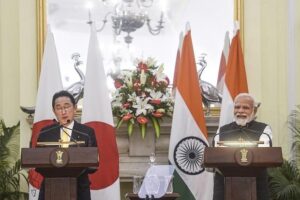


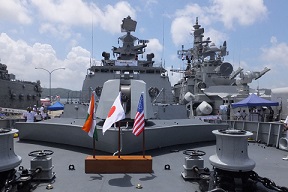




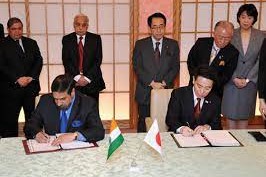

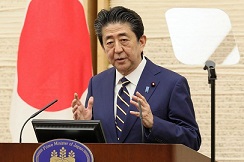
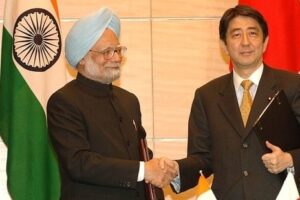

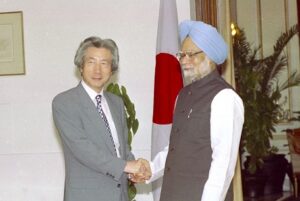
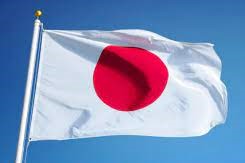
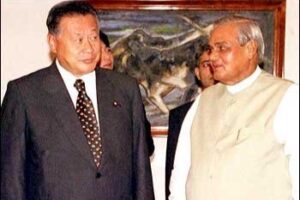
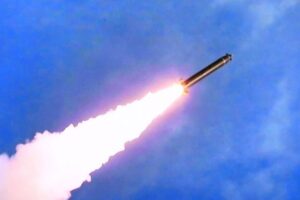




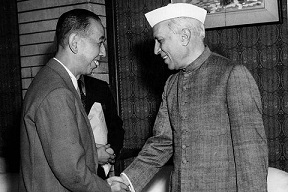






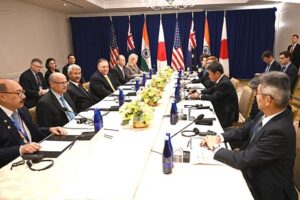
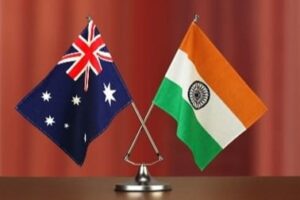


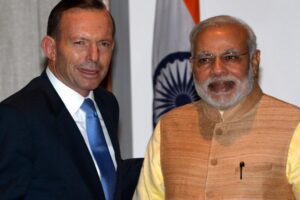





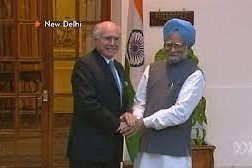





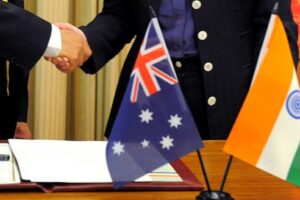
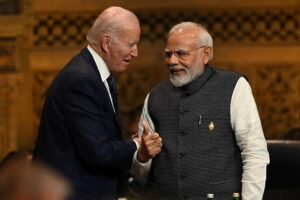


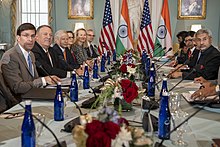



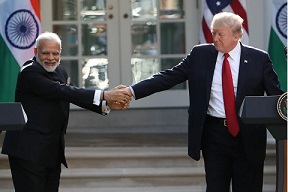
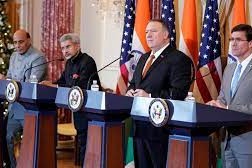

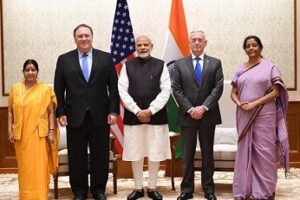
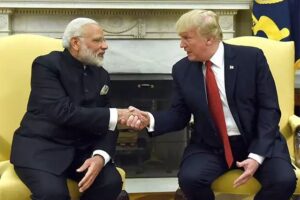
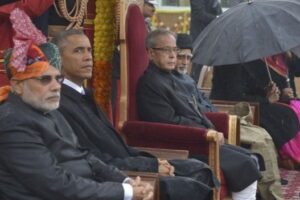
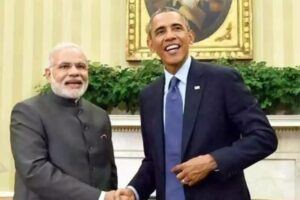
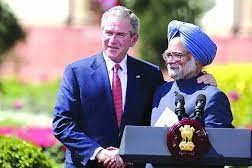

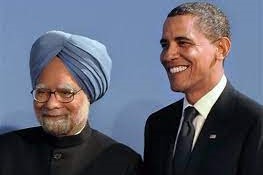

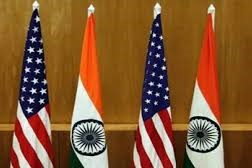

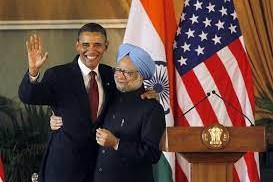


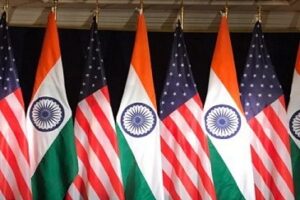
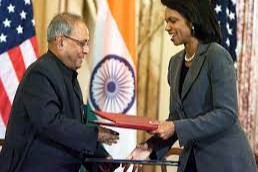






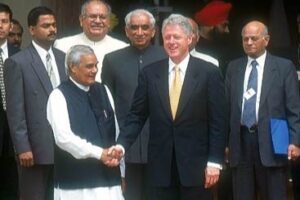


 onducted a total of five underground nuclear tests, breaking a 24-year self-imposed moratorium on nuclear testing. Pakistan followed, claiming 5 tests on May 28, 1998, and an additional test on May 30. The unannounced tests created a global storm of criticism, as well as a serious setback for decades of U.S. nuclear nonproliferation efforts in South Asia. On May 13, 1998, President Clinton imposed economic and military sanctions on India, mandated by Section 102 of the Arms Export Control Act (AECA), and applied the same sanctions to Pakistan on May 30. Some effects of the sanctions on India included: termination of $21 million in FY1998 economic development assistance; postponement of $1.7 billion in lending by the International Financial Institutions (IFI), as supported by the Group of Eight (G-8) leading industrial nations; prohibition on loans or credit from U.S. banks to the government of India; and termination of Foreign Military Sales under the Arms Export Control Act. Humanitarian assistance, food, or other agricultural commodities are excepted from sanctions under the law.
onducted a total of five underground nuclear tests, breaking a 24-year self-imposed moratorium on nuclear testing. Pakistan followed, claiming 5 tests on May 28, 1998, and an additional test on May 30. The unannounced tests created a global storm of criticism, as well as a serious setback for decades of U.S. nuclear nonproliferation efforts in South Asia. On May 13, 1998, President Clinton imposed economic and military sanctions on India, mandated by Section 102 of the Arms Export Control Act (AECA), and applied the same sanctions to Pakistan on May 30. Some effects of the sanctions on India included: termination of $21 million in FY1998 economic development assistance; postponement of $1.7 billion in lending by the International Financial Institutions (IFI), as supported by the Group of Eight (G-8) leading industrial nations; prohibition on loans or credit from U.S. banks to the government of India; and termination of Foreign Military Sales under the Arms Export Control Act. Humanitarian assistance, food, or other agricultural commodities are excepted from sanctions under the law. 







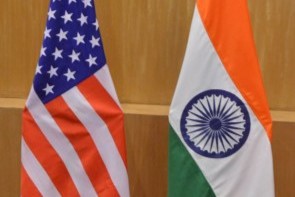








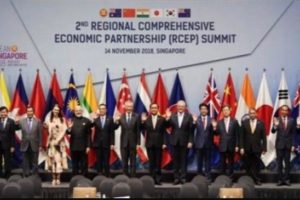 The first ministerial level meeting of QUAD was held on the sidelines of the United Nations General Assembly in New York. Before this, the QUAD had
The first ministerial level meeting of QUAD was held on the sidelines of the United Nations General Assembly in New York. Before this, the QUAD had AusIndEx is an exercise between India and Australia which was first held in 2015.The Australian
AusIndEx is an exercise between India and Australia which was first held in 2015.The Australian 

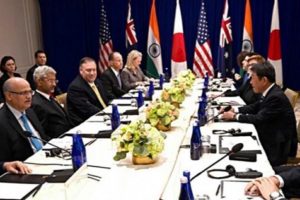





 On recommendations of the Japanese government, the four countries met at Manila, Philippines for ASEAN Regional Forum (ARF) originally, but also ended up having a meeting of what we call the first meeting of four nation states on issues of
On recommendations of the Japanese government, the four countries met at Manila, Philippines for ASEAN Regional Forum (ARF) originally, but also ended up having a meeting of what we call the first meeting of four nation states on issues of 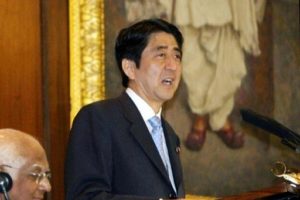 On his official visit to India, Japanese PM Mr. Shinzo Abe reinforced the ties of two nations, i.e., Japan and India with his famous speech about
On his official visit to India, Japanese PM Mr. Shinzo Abe reinforced the ties of two nations, i.e., Japan and India with his famous speech about  In 2007, Japanese President Shinzo Abe resigned from his post citing health reasons. This had a significant impact on QUAD as he was the architect & advocate of QUAD. His successor, Yasuo Fukuda, did not take up QUAD with such zeal leading to dormancy of the forum. (
In 2007, Japanese President Shinzo Abe resigned from his post citing health reasons. This had a significant impact on QUAD as he was the architect & advocate of QUAD. His successor, Yasuo Fukuda, did not take up QUAD with such zeal leading to dormancy of the forum. (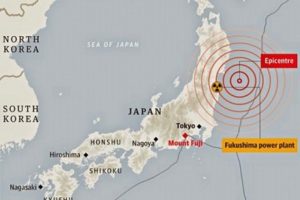 Japan earthquake and tsunami of 2011, also called Great Sendai Earthquake or Great Tōhoku Earthquake, was a 9.0 magnitude earthquake which struck below the floor of the Western Pacific at 2:49 PM. The powerful earthquake affected the northeastern coast of Honshu, Japan’s main island, and also initiated a series of large tsunami waves that devastated coastal areas of Japan, which also led to a major nuclear accident. Japan received aid from India, US, Australia as well as other countries. US Navy aircraft carrier was dispatched to the area and Australia sent search-and-rescue teams.
Japan earthquake and tsunami of 2011, also called Great Sendai Earthquake or Great Tōhoku Earthquake, was a 9.0 magnitude earthquake which struck below the floor of the Western Pacific at 2:49 PM. The powerful earthquake affected the northeastern coast of Honshu, Japan’s main island, and also initiated a series of large tsunami waves that devastated coastal areas of Japan, which also led to a major nuclear accident. Japan received aid from India, US, Australia as well as other countries. US Navy aircraft carrier was dispatched to the area and Australia sent search-and-rescue teams. 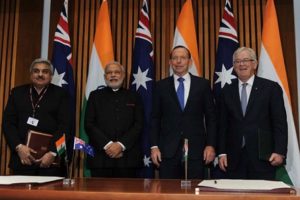 India and Australia signed the
India and Australia signed the 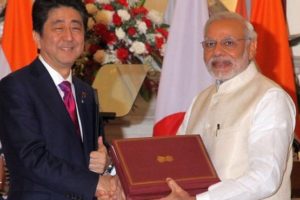 The India-Japan Agreement for Cooperation in the Peaceful Uses of Nuclear Energy was signed on 11 November, 2016 and came into force on 20 July, 2017 which was representative of strengthening ties between India and Japan. Diplomatic notes were exchanged between Dr. S. Jaishankar and H.E. Mr. Kenji Hiramatsu, Ambassador of Japan to India. (
The India-Japan Agreement for Cooperation in the Peaceful Uses of Nuclear Energy was signed on 11 November, 2016 and came into force on 20 July, 2017 which was representative of strengthening ties between India and Japan. Diplomatic notes were exchanged between Dr. S. Jaishankar and H.E. Mr. Kenji Hiramatsu, Ambassador of Japan to India. ( The foreign ministry
The foreign ministry The Officials of QUAD member countries met in Singapore on November 15, 2018 for consultation on regional & global issues of common interest. The main discussion revolved around connectivity, sustainable development, counter-terrorism, maritime and cyber security, with the view to promote peace, stability and prosperity in the
The Officials of QUAD member countries met in Singapore on November 15, 2018 for consultation on regional & global issues of common interest. The main discussion revolved around connectivity, sustainable development, counter-terrorism, maritime and cyber security, with the view to promote peace, stability and prosperity in the  The 23rd edition of trilateral Malabar maritime exercise between India, US and Japan took place on 26 September- 04 October, 2019 off the coast of Japan.
The 23rd edition of trilateral Malabar maritime exercise between India, US and Japan took place on 26 September- 04 October, 2019 off the coast of Japan.  After the first ministerial level meeting of QUAD in September, 2019, the senior officials of US, Japan, India and Australia again met for consultations in Bangkok on the margins of the East Asia Summit. Statements were issued separately by the four countries. Indian Ministry of External Affairs said “In statements issued separately by the four countries, MEA said, “proceeding from the strategic guidance of their Ministers, who met in New York City on the sidelines of the UN General Assembly recently, the officials exchanged views on ongoing and additional practical cooperation in the areas of connectivity and infrastructure development, and security matters, including counterterrorism, cyber and maritime security, with a view to promoting peace, security, stability, prosperity in the Indo-Pacific region.”
After the first ministerial level meeting of QUAD in September, 2019, the senior officials of US, Japan, India and Australia again met for consultations in Bangkok on the margins of the East Asia Summit. Statements were issued separately by the four countries. Indian Ministry of External Affairs said “In statements issued separately by the four countries, MEA said, “proceeding from the strategic guidance of their Ministers, who met in New York City on the sidelines of the UN General Assembly recently, the officials exchanged views on ongoing and additional practical cooperation in the areas of connectivity and infrastructure development, and security matters, including counterterrorism, cyber and maritime security, with a view to promoting peace, security, stability, prosperity in the Indo-Pacific region.” US 2+2 Ministerial Dialogue was held on 18 December, 2019, in Washington DC. Secretary of State Michael R. Pompeo and Secretary of Defense Mark T. Esper will host Indian Minister of External Affairs Dr. S. Jaishankar and Minister of Defense Shri Rajnath Singh. The discussion focussed on deepening bilateral strategic and defense cooperation, exchanging perspectives on global developments, and our shared leadership in the Indo-Pacific region.The two democracies signed the Industrial Security Annex before the 2+2 Dialogue. Assessments of the situation in Afghanistan, Pakistan, Nepal, Sri Lanka, and the Indian Ocean region in general were shared between both countries. (
US 2+2 Ministerial Dialogue was held on 18 December, 2019, in Washington DC. Secretary of State Michael R. Pompeo and Secretary of Defense Mark T. Esper will host Indian Minister of External Affairs Dr. S. Jaishankar and Minister of Defense Shri Rajnath Singh. The discussion focussed on deepening bilateral strategic and defense cooperation, exchanging perspectives on global developments, and our shared leadership in the Indo-Pacific region.The two democracies signed the Industrial Security Annex before the 2+2 Dialogue. Assessments of the situation in Afghanistan, Pakistan, Nepal, Sri Lanka, and the Indian Ocean region in general were shared between both countries. ( The foreign ministers of QUAD continued their discussions from the last ministerial level meeting in 2019, on 6 October, 2020. While there was no joint statement released, all countries issued individual readouts. As per the issue readout by India, the discussion called for a coordinated response to the challenges including financial problems emanating from the pandemic, best practices to combat Covid-19, increasing the resilience of supply chains, and enhancing access to affordable vaccines, medicines and medical equipment. There was also a focus on maintaining stability in the Indo-Pacific region amidst growing tensions. Australian media release mentions “We emphasised that, especially during a pandemic, it was vital that states work to ease tensions and avoid exacerbating long-standing disputes, work to counter disinformation, and refrain from malicious cyberspace activity. Ministers reiterated that states cannot assert maritime claims that are inconsistent with international law, particularly the United Nations Convention on the Law of the Sea (UNCLOS).”
The foreign ministers of QUAD continued their discussions from the last ministerial level meeting in 2019, on 6 October, 2020. While there was no joint statement released, all countries issued individual readouts. As per the issue readout by India, the discussion called for a coordinated response to the challenges including financial problems emanating from the pandemic, best practices to combat Covid-19, increasing the resilience of supply chains, and enhancing access to affordable vaccines, medicines and medical equipment. There was also a focus on maintaining stability in the Indo-Pacific region amidst growing tensions. Australian media release mentions “We emphasised that, especially during a pandemic, it was vital that states work to ease tensions and avoid exacerbating long-standing disputes, work to counter disinformation, and refrain from malicious cyberspace activity. Ministers reiterated that states cannot assert maritime claims that are inconsistent with international law, particularly the United Nations Convention on the Law of the Sea (UNCLOS).” On September 24, President Biden hosted Prime Minister Scott Morrison of Australia, Prime Minister Narendra Modi of India, and Prime Minister Yoshihide Suga of Japan at the White House for the first-ever in-person Leaders’ Summit of the QUAD. The leaders released a Joint Statement which summarised their dialogue and future course of action. The regional security of the Indo-Pacific and strong confidence in the ASEAN remained on the focus along with response to the Pandemic.
On September 24, President Biden hosted Prime Minister Scott Morrison of Australia, Prime Minister Narendra Modi of India, and Prime Minister Yoshihide Suga of Japan at the White House for the first-ever in-person Leaders’ Summit of the QUAD. The leaders released a Joint Statement which summarised their dialogue and future course of action. The regional security of the Indo-Pacific and strong confidence in the ASEAN remained on the focus along with response to the Pandemic. 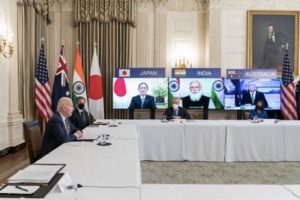 The QUAD Vaccine Partnership was announced at the first QUAD Summit on 12 March 2021 where QUAD countries agreed to deliver 1.2 billion vaccine doses globally. The aim was to expand and finance vaccine manufacturing and equipping the Indo-Pacific to build resilience against Covid-19. The launch of a senior-level QUAD Vaccine Experts Group, comprised of top scientists and officials from all QUAD member governments was also spearheaded.
The QUAD Vaccine Partnership was announced at the first QUAD Summit on 12 March 2021 where QUAD countries agreed to deliver 1.2 billion vaccine doses globally. The aim was to expand and finance vaccine manufacturing and equipping the Indo-Pacific to build resilience against Covid-19. The launch of a senior-level QUAD Vaccine Experts Group, comprised of top scientists and officials from all QUAD member governments was also spearheaded.  Although the Tsunami Core group had to be disbanded on fulfilment of its purpose, however the quadrilateral template that formed remained intact as a successful scaffolding of four countries, as stated by authors Patrick Gerard Buchan and Benjamin Rimland in their diplomatic brief about QUAD ( you can access the brief at
Although the Tsunami Core group had to be disbanded on fulfilment of its purpose, however the quadrilateral template that formed remained intact as a successful scaffolding of four countries, as stated by authors Patrick Gerard Buchan and Benjamin Rimland in their diplomatic brief about QUAD ( you can access the brief at  Secretary of State Colin Powell stated that the Core Tsunami Group was to be disbanded and folded and clubbed with the broader United Nations led Relief Operations. In a Tsunami Relief Conference in Jakarta, Secretary Powell stated that
Secretary of State Colin Powell stated that the Core Tsunami Group was to be disbanded and folded and clubbed with the broader United Nations led Relief Operations. In a Tsunami Relief Conference in Jakarta, Secretary Powell stated that  Soon after the Earthquake and Tsunami crisis, humanitarian reliefs by countries, viz., US, India, Japan, and Australia started to help the 13 havoc-stricken countries. The US initially promised $ 35 Millions in aid. However, on 29
Soon after the Earthquake and Tsunami crisis, humanitarian reliefs by countries, viz., US, India, Japan, and Australia started to help the 13 havoc-stricken countries. The US initially promised $ 35 Millions in aid. However, on 29 At 7:59AM local time, an earthquake of 9.1 magnitude (undersea) hit the coast of Sumatra, an Indonesian island. As a result of the same, massive waves of Tsunami triggered by the earthquake wreaked havoc for 7 hours across the Indian Ocean and to the coastal areas as far away as East Africa. The infamous Tsunami killed around 225,000 people, with people reporting the height of waves to be as high as 9 metres, i.e., 30 feet. Indonesia, Srilanka, India, Maldives, Thailand sustained horrendously massive damage, with the death toll exceeding 200,000 in Northern Sumatra’s Ache province alone. A great many people, i.e., around tens of thousands were found dead or missing in Srilanka and India, mostly from Andaman and Nicobar Islands of Indian territory. Maldives, being a low-lying country, also reported casualties in hundreds and more, with several non-Asian tourists reported dead or missing who were vacationing. Lack of food, water, medicines burgeoned the numbers of casualties, with the relief workers finding it difficult to reach the remotest areas where roads were destroyed or civil war raged. Long-term environmental damage ensued too, as both natural and man-made resources got demolished and diminished.
At 7:59AM local time, an earthquake of 9.1 magnitude (undersea) hit the coast of Sumatra, an Indonesian island. As a result of the same, massive waves of Tsunami triggered by the earthquake wreaked havoc for 7 hours across the Indian Ocean and to the coastal areas as far away as East Africa. The infamous Tsunami killed around 225,000 people, with people reporting the height of waves to be as high as 9 metres, i.e., 30 feet. Indonesia, Srilanka, India, Maldives, Thailand sustained horrendously massive damage, with the death toll exceeding 200,000 in Northern Sumatra’s Ache province alone. A great many people, i.e., around tens of thousands were found dead or missing in Srilanka and India, mostly from Andaman and Nicobar Islands of Indian territory. Maldives, being a low-lying country, also reported casualties in hundreds and more, with several non-Asian tourists reported dead or missing who were vacationing. Lack of food, water, medicines burgeoned the numbers of casualties, with the relief workers finding it difficult to reach the remotest areas where roads were destroyed or civil war raged. Long-term environmental damage ensued too, as both natural and man-made resources got demolished and diminished.
No responses yet